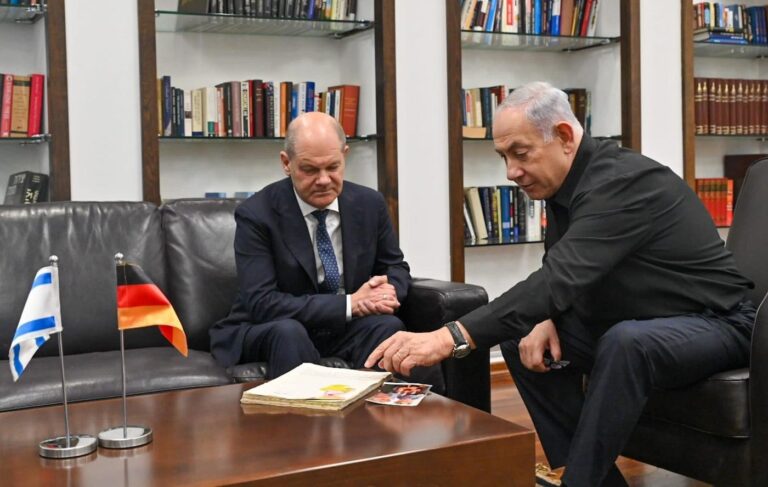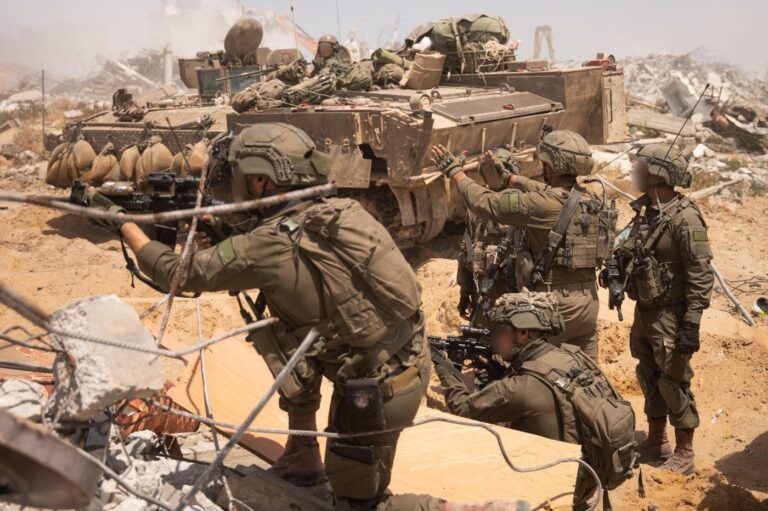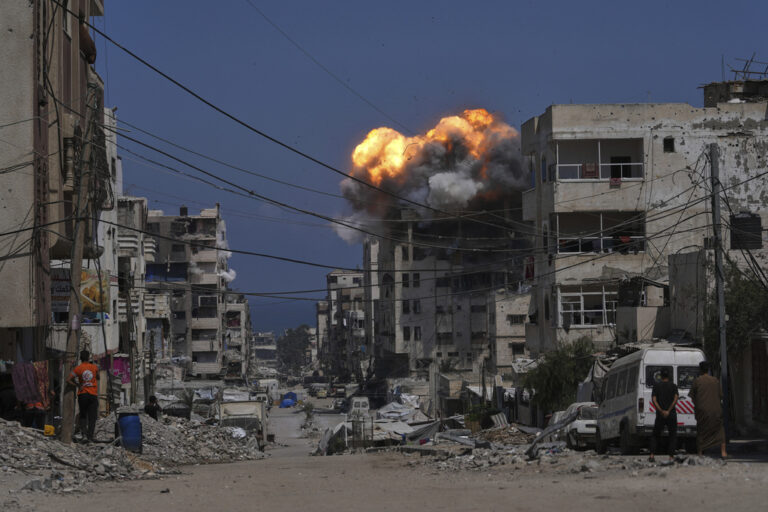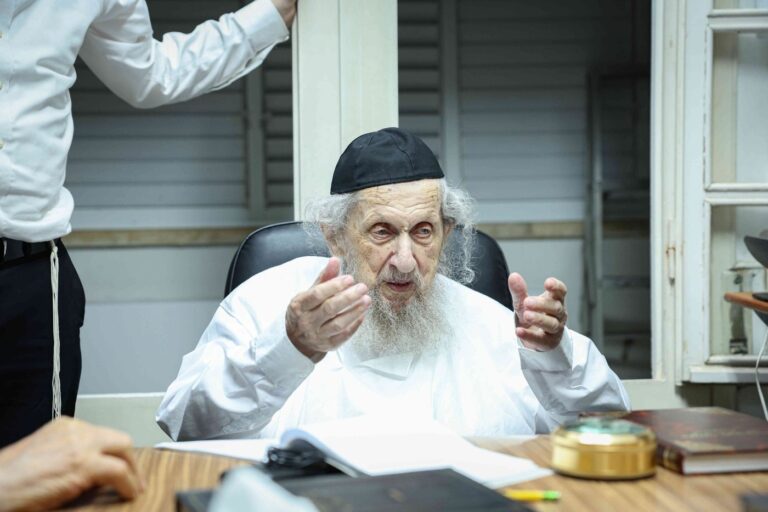 HaGaon HaRav Bentzion Mutzafi Shlita, who heads Badatz Bnei Tzion, was asked why chareidim are opposed to serving in the IDF, with the person pointing out ‘Even King David and his son Shlomo maintained armies’.
HaGaon HaRav Bentzion Mutzafi Shlita, who heads Badatz Bnei Tzion, was asked why chareidim are opposed to serving in the IDF, with the person pointing out ‘Even King David and his son Shlomo maintained armies’.
The rav’s response began “you must be a new immigrant”, continuing to explain. “If they provide me with kosher food on my level, make certain I will not be exposed to pritzus and to’eva, and I will not be required to listen to foul language, and permit me to keep Shabbos as required, and make certain that I will not be compelled to hear the words of heretics against Our Father in Heaven, and I am permitted to observe the mitzvos as I am required, then I too will enlist!”
The rav concluded “however, the IDF has rejected my conditions”.
(YWN – Israel Desk, Jerusalem)











16 Responses
The Rav’s argument against enlistment does not work in a democratic and pluralistic society such as EY. If every segment of the society could impose its own “condition” on serving in the nation’s defense forces, than no one would be required to serve. The IDF has made an effort at accommodating the Chareidi Tzibur but it cannot accommodate everyone’s hashkafah. Many Chareidim serve in the nachal brigades and have not gone OTD when they return home. Mutzafi seems inflexible (after citing all his “conditions” for service) and that assures that there will be no possibility for compromise on the issue of national service.
Although the Rav’s critique of conditions in most IDF units is correct it misses the point; even if all such conditions were met (and they should be for the benefit of all soldiers) those who learn full time would still seek an exemption from army service.
The hardest thing for the charaidi community to explain to the larger world is the sincere belief that limmud Torah is more important than physical histadlus for national defense. But if we are going to win the argument we need to tell the truth.
The Rav shlita is 100% correct. (Not that he needs my haskama.)
The Israeli army is full of pritzus and to’eva, and is well known to have more pritzus than virtually any other army in the world. It is completely rampant.
I assume the esteemed Rav would not allow his talmidim to walk out of their houses, as simply walking in the streets exposes one to pritzus, to’eva, words of heretics, and foul language.
Perfect goals and not impossible for perfecting the Nachal Charadi” units.
That’s called “Nachal Charedi”, part of your conditions are dependent on the army and a part depend on you/the people around you, but in general what he describes is “Nachal Charedi” and probably any Shachar program.
That was not an emesdig answer. The govt. offered Chareidim the choice of National Service, where the men can eat and sleep at home, but spend their days in Hatzoloh, Zaka, or as aides for elderly Chareidi men in nursing homes or hospitals in their own communities. They turned it down.
In other words, my way or the highway.
Let’s go through the issues raised one by one:
1. Kosher food – The army has been willing to do so, and in fact do so for the Nachal Chareidi. The army may not be willing to convert the entire army to Mehadrin standards, but they are not averse to making reasonable accommodations with respect to Kashrus.
2. “Make certain” soldiers will not be exposed to Pritzus and To’eva – the army has set up special units that are male only to prevent deliberate exposure to inappropriate materials and situations. Yes, there have been cases where people in general army units have been unwillingly exposed to offensive material/situations, but not in the units that are oriented toward Chareidim. While nobody can “guarantee” that one will not be exposed to something inappropriate, there’s no guarantee that one will not be exposed in a non-military workplace either. The best that can be asked is that the army give its best efforts to avoid such exposure – and in the units oriented towards Chareidim, they have.
3. Listening to foul language – same as above. The army can do its best, but there are no guarantees in any workplace.
4. Keep Shabbos as required – the army, by regulation, requires that people be allowed to keep Shabbos. That being said, there are, by the very nature of being an army, serious issues of Pikuach Nefesh that require actions that in other situations would be Assur on Shabbos. As I learned Halacha, though, carrying out these actions on Shabbos is what Halacha requires – so it can not be said that forcing a soldier to carry out these actions prevents one from keeping Shabbos. In a case of Pikuach Nefesh, not only is one allowed to commit melacha, one is required to commit the melacha, and it is considered a mitzvah. As such, one can not say that the army prevents one from keeping Shabbos as required.
5. Not hearing the words of heretics against HKB”H – not sure what he is referring to, as there is no requirement in the army for one to hear such things. There are some individuals, including commanders, who will spout off on such topics, but as above, you’ll have things like this in any workplace. Also as noted above, the army has units oriented towards Chareidim, the commanders of which are specifically selected for/instructed to show sensitivity to the religious sensibilities of those under their command.
6. Permitted to observe Mitzvos – the army gives times for Davening – by law. In the Chareidi units, there is also specific time given for Shiurim, etc. There is nothing preventing someone in such units from keeping mitzvos – and unlike those who do not serve, they get the Mitzva of saving the lives of their fellow Jews.
Notwithstanding the above, there is clearly room for improvement in the army – but standing there and shouting how bad the army is will change nothing. You can’t expect the army to change itself overnight when there is no guarantee – or even expectation – that those opposed to service will not come up with yet another red herring of a reason why Chareidim can’t serve. If there was a good-faith effort by Chareidim to work with the army, you’d be amazed by how far the army is willing to go to accommodate.
an Israeli Yid
If the IDF met his demands, for a frum framework (on a Ben Torah level, rather than the “baal ha-bayis” level they provide for the existing frum unit), that would still leave the problem that they would never have any officers who were bnei Torah (note the recent incident where part of officer training was exposure to women acting immodestly as a “test” to become an officer) – meaning the unit would be analagous to the former American “Buffalo” (colored regiments) soldiers, or the former British “Native” regiments — all of which ended poorly.
At the above pertains to someone who is a zionist to begin with. An anti-zionist would have different objections (holding that killing the Arabs is prohbited since the zionists were engaged in a war of aggression contrary to halacha as Ha-Shem never authorized as to conquer Eretz Yisrael at this time under these conditions).
To #9.It is not nor has it ever been the Israeli armies goal to kill arabs – rather to defend Jews. As the Halachah goes when someone comes to kill you, then you must kill them first. In fact only the Israeli army goes out of its way to spare civilians when enemy combatants are hiding behind women and children.
#10 – If the goal of the zionists wasn’t to kill Arabs, and to defend Jews, they would have agreed to an Arab state with an autonomous Jewish community. Zionism’s “ikar” (if you are trying to justify it by halacha, something the Israelis categorically reject) is that there is a mitsva to established a medinah at this time by force (traditionally, we held that the mitsva of conquering the land was only at the time of Yehoshua, and that goyim have the right to live peacefully in Eretz Yisrael). In halacha, if you are going out to kill someone and they act to defend themselves, you have the duty to withdraw. If the Zionists don’t want to kill Arabs they should withdraw their forces and seek a peaceful solution (which means the end of the medinah, since the minimum the Arabs will accept is being masters in what had been their house for centuries).
However the article was about someone who supports the zionist position, but objects only to the anti-Torah manner in which the zionists have established their medinah.
even if all of these demands were met, it would be assur to have a Jewish army – David’s army had the guidance of prophets and the Urim VeTumim – without that, Jews are not allowed to go to war except in self-defense, and we are not allowed to have a State without prophets permitting it. It has nothing to do with religious accommodations. The Brisker Rov zya said even if the State was 100% frum, it would still be forbidden until Moshiach comes, which will be announced by Elijah the Prophet
To all those who posted above based on the Shita that it’s Assur to have a State before Mashiach (yes, I mean you akuperma and Kolemes) –
I might strongly disagree, but there is such a Shita. However, the Rav whose comments are being reported here does NOT make that argument, and apparently does not hold of such a Shita – he gives other reasons, which are easily debunked. As such, the views of the Satmar Rav or the Brisker Rav are irrelevant to this discussion – as are your comments.
an Israeli Yid
to #10 maybe your argument might have been valid in 1948 but the reality is that in 2014 the option is essentially defend yourself or die. Withdraw to where? the mediteranean? making a deal with the arabs would be as fruitful as lets say a deal with hitler and if you believe otherwise you are indeed very naive.
“since the minimum the Arabs will accept is being masters in what had been their house for centuries ”
They have not been the master the Land for centuries. Before Jews, it was the British and the Ottoman Turks for hundreds of years. You are full of blind hatred.
מאכילין את העניים דמאי ואת האכסנייה דמאי. What do his personal standards have to do with it? Unless he means to say that rabbanut food is treif, in which case he’d be saying lashon hora about quite a wide population.